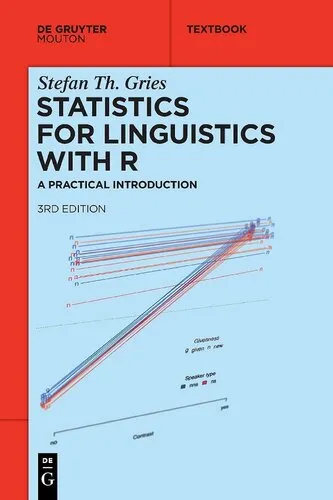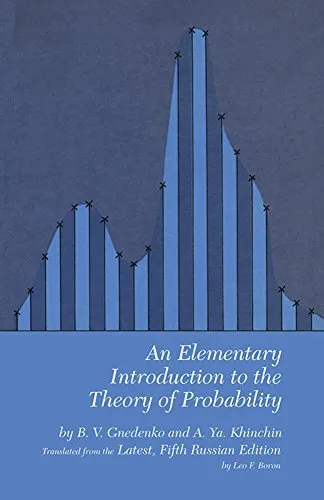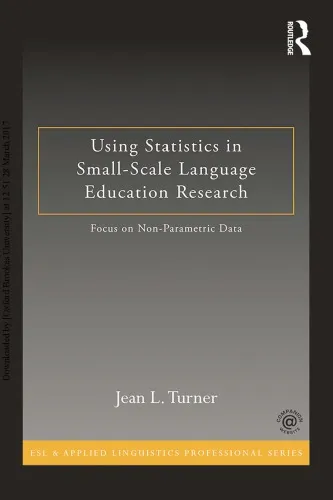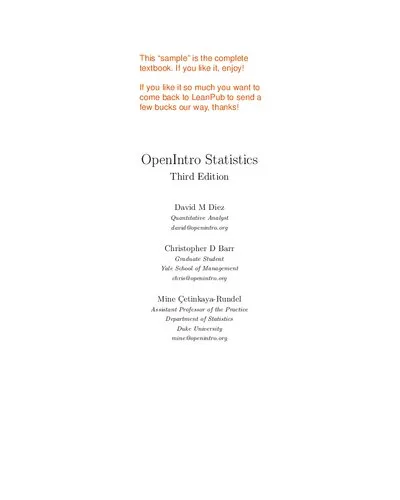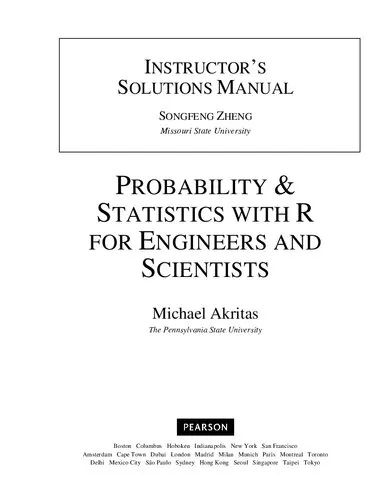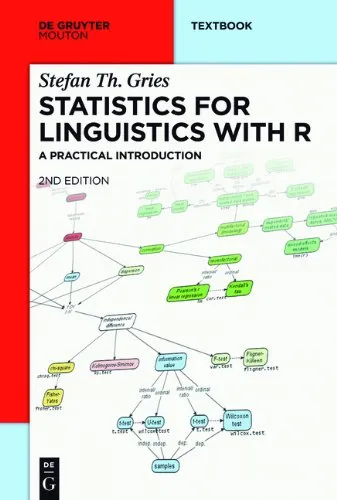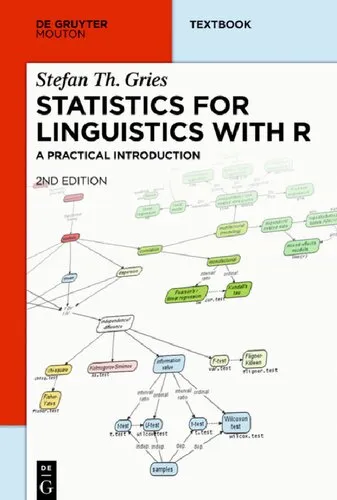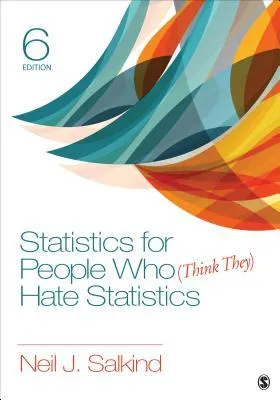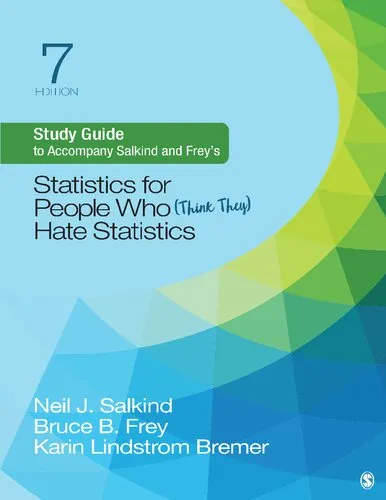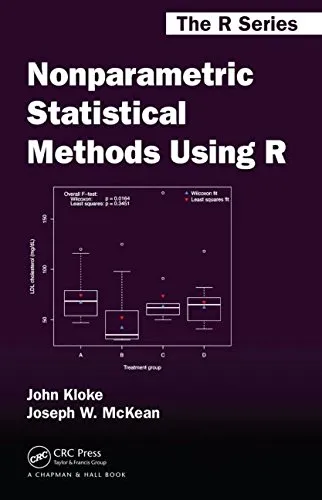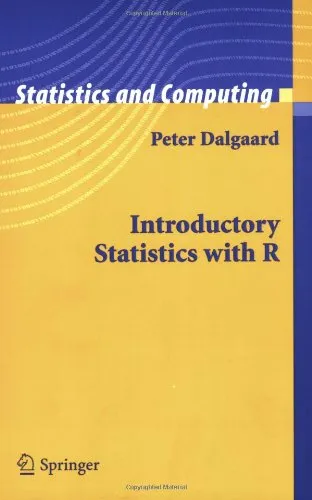Statistics for Linguistics with R: A Practical Introduction (Mouton Textbook)
4.5
بر اساس نظر کاربران

شما میتونید سوالاتتون در باره کتاب رو از هوش مصنوعیش بعد از ورود بپرسید
هر دانلود یا پرسش از هوش مصنوعی 2 امتیاز لازم دارد، برای بدست آوردن امتیاز رایگان، به صفحه ی راهنمای امتیازات سر بزنید و یک سری کار ارزشمند انجام بدینکتاب های مرتبط:
معرفی کتاب «Statistics for Linguistics with R: A Practical Introduction»
کتاب «Statistics for Linguistics with R: A Practical Introduction» اثر استیفن تی. گریس، یکی از برجستهترین منابع آموزش آمار در حوزه زبانشناسی محسوب میشود. این کتاب با تمرکز بر استفاده از نرمافزار R و کاربردهای آن در زبانشناسی، به طور عملی و کاملاً کاربردی مفاهیم آماری را معرفی میکند.
خلاصهای از کتاب
این کتاب در اصل به زبانشناسان و دانشجویان زبانشناسی طراحی شده است تا آنها را با تحلیل دادههای تجربی آشنا کند. نویسنده با استفاده از زبان ساده و ملموس، پیچیدگیهای آمار را کاهش داده و تمرکز را به استفاده عملی از آمار در پروژههای زبانشناسی معطوف کرده است. Statistics for Linguistics with R با ارائه مثالهای واقعی و پروژههای عملی، به دانشجویان کمک میکند تا یادگیریشان را در عمل تقویت کرده و نقش آمار را به عنوان بخشی از تحقیقات علمی زبانشناسی بهتر درک کنند.
ساختار کتاب به گونهای است که از مفاهیم ابتدایی آمار (مانند توزیعهای آماری و آزمون t) آغاز کرده و به مفاهیم پیشرفتهتر مانند مدلسازی رگرسیونی و تحلیل چندمتغیره میپردازد. علاوه بر این، در هر فصل، نویسنده دقت دارد که کاربردهای عملی مفاهیم را از طریق R توضیح دهد.
نکات کلیدی
- آموزش جامع نحوه کار با R برای تحلیلهای آماری.
- ارائه مثالهای واقعی از دادههای زبانشناسی برای درک عمیقتر مفاهیم.
- پوشش آزمونهای آماری پایه و پیشرفته مانند آزمون t، تحلیل واریانس، و رگرسیون.
- تبیین مفاهیم به زبانی ساده و قابل فهم برای مبتدیان و متخصصین.
- شامل تمرینهایی برای تمرین بیشتر و حل مسائل عملی در زبانشناسی تجربی.
جملات مشهور از کتاب
“Data analysis without clear hypotheses is like setting out on a journey without a map.”
“Understanding statistics isn't just about knowing formulas; it's about asking the right questions and interpreting results correctly.”
“R may seem intimidating at first, but once mastered, it becomes an integral tool for any linguist interested in empirical data.”
چرا این کتاب اهمیت دارد؟
در دنیای امروز، زبانشناسی تنها یک رشته نظری نیست بلکه بخش بزرگی از آن به تحلیل دادههای تجربی و آماری متکی است. این کتاب به طور منحصربهفردی نشان میدهد چگونه میتوان از آمار به عنوان ابزاری قوی برای کشف الگوها و روندهای زبانی استفاده کرد.
اهمیت این کتاب در این است که مفاهیم آماری پیچیده را به وضوح شرح میدهد و از زبانی استفاده میکند که برای افرادی که پیشزمینهای در ریاضیات ندارند، قابل دسترس باشد. همچنین، تمرکز بر R به عنوان یک نرمافزار رایگان و قدرتمند، امکان استفاده عملی و بدون هزینه اضافی را برای طیف وسیعی از محققان فراهم میکند.
این کتاب به ویژه برای دانشجویان و محققان زبانشناسی که خواهان یادگیری مهارتهای تحلیل داده هستند، ابزاری حیاتی است. نه تنها به یادگیری تئوری مفاهیم آماری میپردازد، بلکه نحوه استفاده عملی از آنها را نیز پوشش میدهد. از این رو، این کتاب به عنوان یک راهنمای کامل برای هر زبانشناسی که به کار با دادههای تجربی علاقهمند است، ضروری به حساب میآید.
Introduction to "Statistics for Linguistics with R: A Practical Introduction"
"Statistics for Linguistics with R: A Practical Introduction" is a highly regarded textbook that combines the essential principles of linguistics and statistics with a practical hands-on approach using R, a powerful programming language specifically designed for data analysis. Authored by Stefan Th. Gries, this book caters both to beginners in the field of linguistics and seasoned researchers who wish to strengthen their statistical base while leveraging R to analyze linguistic data effectively.
The textbook bridges the gap between statistical concepts and their practical application in linguistics, enabling readers to apply these concepts to their own research. Written in clear, accessible language, the book is specifically structured to make difficult concepts more approachable while offering practical exercises that reinforce learning. This introduction provides an overview of the book’s key sections, notable insights, and its importance for the linguistics and data analysis communities.
Detailed Summary of the Book
The book is divided into well-structured chapters, each serving a specific purpose in bringing the reader closer to mastering the application of statistics in linguistics using R. Gries begins with a foundation of statistical basics, ensuring that even readers without prior statistical knowledge can follow along. Topics such as descriptive statistics, probability theory, hypothesis testing, and ANOVA (Analysis of Variance) are discussed thoughtfully and in detail.
What sets this book apart is the integration of the R programming language in every chapter. Readers are not only introduced to theoretical concepts but also shown step-by-step instructions on how to implement these concepts in R. This dual approach allows readers to gain practical skills, which can then be transferred to their own linguistic datasets.
As the book progresses, Gries delves into more advanced topics including regression analysis, correlations, and multifactorial designs. Beyond the technical aspects, the author addresses common pitfalls in statistical analysis, empowering readers to critically evaluate data and research findings. By the end of the book, readers will have developed a robust understanding of how to approach quantitative linguistic research and communicate their results effectively.
Key Takeaways
- Hands-on Learning with R: Readers gain practical experience in performing statistical analyses directly within the R programming environment, which is one of the most versatile and widely used tools for data analysis.
- Applicability to Linguistics: The examples and exercises are tailored specifically for linguistic data, including phonetics, syntax, morphology, semantics, and psycholinguistics, making the book extremely relevant to its audience.
- Clear Explanations: Abstract statistical concepts are explained in an intuitive and approachable manner, making them accessible to readers without a strong mathematical background.
- Comprehensive Coverage: The book covers everything from basic descriptive statistics to more complex techniques such as multifactorial statistical testing, making it useful across a variety of linguistic subfields.
Famous Quotes from the Book
"Statistics is not about numbers; it’s about understanding patterns, probabilities, and making informed decisions from data."
"Linguistics is one of the most data-rich fields one can work in; yet, few disciplines have as much to gain from the thoughtful application of statistics."
"The beauty of R lies in its flexibility: once you understand the basics, you can adapt it to virtually any data-driven problem."
Why This Book Matters
For linguistics students and professionals, understanding statistical methods is becoming increasingly indispensable. Modern linguistic research demands rigorous data analysis, and insights gained from quantitative research often have significant theoretical and applied implications. "Statistics for Linguistics with R" not only fills a gap in accessible educational resources for linguistic statistics but also empowers researchers to independently analyze their datasets using R.
In a world where data-oriented research is growing in prominence, this book equips readers with the practical tools they need to keep up with trends and conduct scientifically sound analyses. Furthermore, it challenges the notion that statistics is an intimidating or inaccessible domain, demonstrating instead that, with the right guidance and tools, anyone can master statistical methods.
Finally, by focusing on linguistics-specific datasets and scenarios, Gries ensures that readers can relate to the problems discussed, making the learning process much more engaging and relevant. Whether you are an undergraduate student, a seasoned linguist, or a professional researcher, this book is a valuable resource that will significantly enhance your research abilities and understanding of quantitative linguistics.
دانلود رایگان مستقیم
شما میتونید سوالاتتون در باره کتاب رو از هوش مصنوعیش بعد از ورود بپرسید
دسترسی به کتابها از طریق پلتفرمهای قانونی و کتابخانههای عمومی نه تنها از حقوق نویسندگان و ناشران حمایت میکند، بلکه به پایداری فرهنگ کتابخوانی نیز کمک میرساند. پیش از دانلود، لحظهای به بررسی این گزینهها فکر کنید.
این کتاب رو در پلتفرم های دیگه ببینید
WorldCat به شما کمک میکنه تا کتاب ها رو در کتابخانه های سراسر دنیا پیدا کنید
امتیازها، نظرات تخصصی و صحبت ها درباره کتاب را در Goodreads ببینید
کتابهای کمیاب یا دست دوم را در AbeBooks پیدا کنید و بخرید
1319
بازدید4.5
امتیاز0
نظر98%
رضایتنظرات:
4.5
بر اساس 0 نظر کاربران
Questions & Answers
Ask questions about this book or help others by answering
No questions yet. Be the first to ask!
